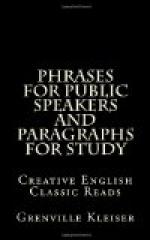From “To the Young Men of Italy.”
* * * * *
Even if we conquer the South, as conquer we must, unless chastened by visible misfortunes in the North, our triumph breeding unbounded conceit, we plunge the deeper in the vortex of voluptuous prosperity, our country forgotten by the people, its honors and dignities the sport and plunder of every knave and fool that can court or bribe the mob, the national debt repudiated, justice purchased in her temples as laws now are in the Legislature, the life and property of no man safe, the last relics of public virtue destroyed, anarchy will reign amid universal ruin. Daniel Dougherty.
From “Address on the Perils of the Republic.”
* * * * *
To conclude “How are the mighty fallen!” Fallen before the desolating hand of death. Alas, the ruins of the tomb! The ruins of the tomb are an emblem of the ruins of the world; when not an individual, but a universe, already marred by sin and hastening to dissolution, shall agonize and die! Directing your thoughts from the one, fix them for a moment on the other. Anticipate the concluding scene, the final catastrophe of nature, when the sign of the Son of man shall he seen in heaven; when the Son of man Himself shall appear in the glory of his Father, and send forth judgment unto victory. The fiery desolation envelops towns, palaces, and fortresses; the heavens pass away! the earth melts! and all those magnificent productions of art which ages heaped on ages have reared up are in one awful day reduced to ashes. ELIPHALET Nott.
From the sermon “On the Death of Alexander Hamilton.”
* * * * *
“Westward the course of empire takes its way;
The four first acts already past,
A fifth shall close the drama with the day:
Time’s noblest offspring is the last.”
This extraordinary prophecy may be considered only as the result of long foresight and uncommon sagacity; of a foresight and sagacity stimulated, nevertheless, by excited feeling and high enthusiasm. So clear a vision of what America would become was not founded on square miles, or on existing numbers, or on any common laws of statistics. It was an intuitive glance into futurity; it was a grand conception, which




